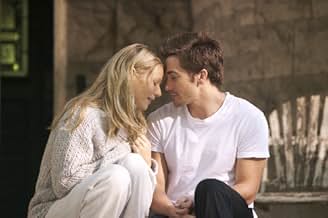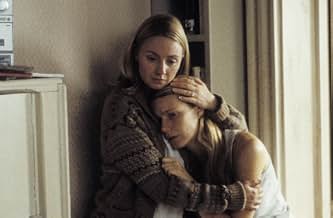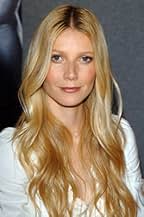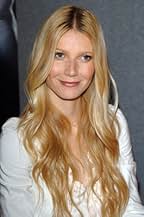La figlia di un matematico brillante ma mentalmente disturbato, recentemente scomparso, cerca di fare i conti con la sua possibile eredità: la sua follia.La figlia di un matematico brillante ma mentalmente disturbato, recentemente scomparso, cerca di fare i conti con la sua possibile eredità: la sua follia.La figlia di un matematico brillante ma mentalmente disturbato, recentemente scomparso, cerca di fare i conti con la sua possibile eredità: la sua follia.
- Premi
- 4 vittorie e 6 candidature totali
- Limo Driver
- (as Tobiacz Daszkiewicz)
- University Friend
- (as C Gerod Harris)
- American Student
- (non citato nei titoli originali)
- Wake Guest
- (non citato nei titoli originali)
Recensioni in evidenza
Mr. Auburn and Rebecca Miller, a movie director, herself, took the task of adapting "Proof" for the screen. The result, directed by John Madden, opens the play in cinematic terms, no small undertaking in presenting the movie to a wider audience who might not be interested in science, and much less in the advanced math that plays an important role in the proceedings.
If you haven't seen the film, please stop reading here.
Catherine, the 27 year old, at the center of the film, is a woman who has stayed behind to take care of her aging father, a man much esteemed in academic circles, who is suffering from, perhaps, a neurological illness that is killing him slowly. Catherine has, in a way, sacrificed her life in order to see that Robert spends his last days at home instead of at an institution.
The death of the father brings Claire home. This woman, who lives in New York, wants to get rid of everything connected with her father. She even has made plans for Catherine to move from Chicago to be near each other in New York, where things are much better. To complicate things, Harold, the nerdy math student, finds a hidden notebook that might contain a discovery that will revolutionize math. The only problem is the proof might not have been the dead man's own creation.
"Proof" works as a film because of Mr. Madden's direction. We are kept involved in what is going on because we have been won by Catherine, the wounded woman trying to live her life without having to tend to a sick man. Catherine love for math, in a way, makes her realize her place is in the same institution where her father made mathematical discoveries as she will be following his steps.
Gwyneth Paltrow makes an excellent Catherine, a role she had played on the London stage. Ms. Paltrow is a welcome presence in the movie because of the intelligence she projects when working with a good director like John Madden. In fact, it has been a while since we saw this actress in a film.
Hope Davis, another excellent actress, plays Claire, the materialistic sister who has arrived and who wants to transform the frumpy Catherine and mold her to her own taste. Ms. Davis has accustomed us to expect a valuable contribution to any film in which she plays. As Claire, she clearly understand who this character she is portraying really is.
Anthony Hopkins has only a few good moments on the screen. Jake Gyllenhaal's character Harold is not as effective as Ben Shenkman's was on the stage. In fact, Mr. Gyllenhaal, with his dark good looks, seems to be someone who would not be interested in math at all.
"Proof" is an immensely rewarding film thanks to what John Madden's vision.
The assembled supporting cast is impressive in name; however, Sir Anthony Hopkins is solid, but not great in the relatively small, but crucial role as Paltrow's once genius, then insane, now dead father. His influence on her life is beyond question and how she deals is the heart of the story. Jake Gyllenhaal, although a fine actor, is totally miscast as Hopkins' former student who tries to secure the legacy. Hope Davis is perfect as the irritating sister of Paltrow who has "been working 14 hour days" for 5 years while Paltrow cared for dear old nutty dad.
What prevents the film from being great is that it never decides what it is about. It is a film about a math genius (or two) but it shows almost no math. Is it a film about genius? Is it about insanity? Is it about caring for an elderly parent? Is it a film of self-discovery? All of these are touched on, but none are hit head-on. It is a fine film, definitely worth seeing, but it will probably leave you feeling a bit empty.
The flashbacks cut effectively back and forth and smooth out where each character is coming from.
"Catherine," the daughter of a brilliant mathematician who is somewhat modeled on John Nash's struggles with madness which were portrayed in "A Beautiful Mind," is still the focal point of attention. But with the other characters fleshed out more Gwyneth Paltrow has more to naturalistically react to than the stage actresses (I saw it on Broadway with a mercurial Anne Heche). Paltrow brings unexpected fragility to the role and makes her sarcastic accusations to her sister come out of personal pain and not just spitefulness. You really see that she is emotionally ravaged from putting her life and mind on hold for a father with a very strong personality.
Anthony Hopkins is unusually paternal as the father and you understand her attractions and fear of him, as well as why the sister had to flee how insecure she felt there, as Hope Davis manages to breathe some life into a strident character. We see very clearly the demands of being a caregiver to a legend. Unlike in "Iris" at the end of careers, we do ache at the sacrifices the young caregiver has made and how this claustrophobic existence has led to her own crippling doubts about her work, her life and her sanity.
Jake Gyllenhaal is the hunkiest, most adorable, rock 'n' rollin' math graduate student since Matt Damon in "Good Will Hunting" and could help increase math enrollments around the country. But as irresistible as he is, and their relationship is literally more believably fleshed out as young people than in the play, we also can share Paltrow's suspicion of him. But we see more of his activities, as the film opens up the play, so we too clearly know before she that he has regained in our credibility as he seeks his proof. I don't mind that the film adds to the romantic aspects and drawn out coda as I thought the play tempted unfulfillingly in that direction and it is a means to help her regain the multiple meanings of proof -- as evidence, as trust, as confidence.
Director John Madden keeps the camera moving actively during long dialog interchanges, reflecting "Catherine"s agitated state of mind. The house and academic setting well establish the atmosphere, particularly when there's more people around, though some of the outdoor shots seemed like filler.
The score is occasionally intrusive, but the concluding voice-over is even more annoying and unnecessary.
She inhabits her character so fully, I was pulled in and so completely entranced the entire time. In fact, certain words or phrases are reused and have an uncanny allusion to when they were previously said. The effect as that you experience and follow the moments, and the thoughts of the characters, even though they are so deeply imbedded within. I credit Gwyneth and the director with making this work so well. I've never experienced such an organic link between phrases separated in time in a movie before. Wow!
This is a movie about how a daughter, her sister, and a grad student deal with the passing of a great mathematician. While there may be similarities with 'A Beautiful Mind' and even 'Good Will Hunting', knowing there are any such links didn't help me with this movie and I think actually does a dis-service. This movie stands on its own. Ignore any such comparisons.
Acting-wise, there were strong performances all around with Anthony Hopkins giving a top-notch performance. Jake Gyllenhaal's was strong, but perhaps not to the level of his rather awesome performance in Brokeback Mountain.
Good things aside, the one thing that irked me about this film, was that given the strong link to mathematics, how unbelievable some of the dialogue was regarding the 'math. While Gwyneth's and Hopkins' characters pulled off a sense of mathematical intelligence, Jake's character hardly said anything mathematically competent and even came across as flustered in expressing himself mathematically leaving me feeling cheated. In my view, this is chiefly the fault of the screenplay but to a lesser extent in the actor's portrayal. Ignore this rather small point, and this movie passes with flying colours. Q.E.D.
Lo sapevi?
- QuizAccording to the clues of Hal, played by Jake Gyllenhaal, the proof can be the proof of Riemann hypothesis. He says "a very important proof, of a mathematical theorem about prime numbers, which mathematicians are trying to prove; it's historic; you can publish it, give press conferences; all newspapers in the world will talk to the person who have found it." It's one of the Millennium Problems.
- BlooperThe daughter talks about how the father was looking for a message from aliens in the Dewey decimal call numbers on the books from the University of Chicago library. The University of Chicago uses Library of Congress call numbers, which begin with letters, not numbers.
- Citazioni
Catherine: [Reading Robert's Notebook] "Let X equal the quantity of all quantities of X. Let X equal the cold. It is cold in December. The months of cold equal November through February. There are four months of cold, and four of heat, leaving four months of indeterminate temperature. In February it snows. In March the Lake is a lake of ice. In September the students come back and the bookstores are full. Let X equal the month of full bookstores. The number of books approaches infinity as the number of months of cold approaches four. I will never be as cold now as I will in the future. The future of cold is infinite. The future of heat is the future of cold. The bookstores are infinite and so are never full except in September..."
- ConnessioniFeatured in The 63rd Annual Golden Globe Awards 2006 (2006)
- Colonne sonoreEl chocha loca
(2002)
Written by Claudio Quattrocchi
Performed by Loca
Published by Big Tiger Music (BMI)
Courtesy of Lovecat Records
By Arrangement with Ocean Park Music Group
I più visti
- How long is Proof?Powered by Alexa
Dettagli
- Data di uscita
- Paese di origine
- Sito ufficiale
- Lingua
- Celebre anche come
- Proof
- Luoghi delle riprese
- Aziende produttrici
- Vedi altri crediti dell’azienda su IMDbPro
Botteghino
- Budget
- 20.000.000 USD (previsto)
- Lordo Stati Uniti e Canada
- 7.535.331 USD
- Fine settimana di apertura Stati Uniti e Canada
- 193.840 USD
- 18 set 2005
- Lordo in tutto il mondo
- 14.189.860 USD
- Tempo di esecuzione1 ora 40 minuti
- Colore
- Mix di suoni
- Proporzioni
- 2.35 : 1
Contribuisci a questa pagina






































